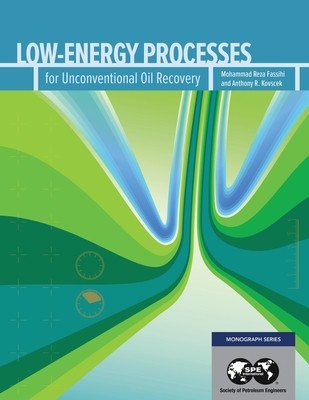
- We will send in 10–14 business days.
- Author: Reza Fassihi
- Publisher: Society of Petroleum Engineers
- ISBN-10: 1613994753
- ISBN-13: 9781613994757
- Format: 21.6 x 27.9 x 2.1 cm, minkšti viršeliai
- Language: English
- SAVE -10% with code: EXTRA
Low-Energy Processes for Unconventional Gas Recovery (e-book) (used book) | bookbook.eu
Reviews
Description
Low-Energy Processes for Unconventional Oil Recovery fills a gap in oil and gas literature. Today, in our globalized society, the oil industry has to demonstrate how oil recovery can be done responsibly over the life-cycle of the project, clearly articulating energy efficiency as well as limiting CO2 and environmental footprints of the chosen recovery processes. The authors bring together their complementing expertise to provide the reader with an in-depth discussion of a range of alternative recovery techniques. Most recovery methods included are focused on heavy oil recovery, but some have applications in light oil reservoirs as well. With the recent industry drive and focus to recover hydrocarbons from tight rock and shale resources, a chapter has also been devoted to shale oil recovery.
This monograph, in combination with Prats' classic work, provides a comprehensive treatment of the thermal and nonthermal options available to engineers and geoscientists who tackle the difficult problem of converting unconventional resources to reserves. There is promise for enhanced recovery with a reduced environmental footprint using polymer solutions, activation of solution gas drive and waterflood recovery mechanisms through selective periods of voidage replacement ratio less than unity, steam foam, and in-situ combustion, among other techniques.
This book presents the state-of-the-art in technologies associated with recovering hydrocarbons from unconventional reservoirs. Importantly, the authors worked to go both broad and deep in their analysis.
EXTRA 10 % discount with code: EXTRA
The promotion ends in 23d.08:00:57
The discount code is valid when purchasing from 10 €. Discounts do not stack.
- Author: Reza Fassihi
- Publisher: Society of Petroleum Engineers
- ISBN-10: 1613994753
- ISBN-13: 9781613994757
- Format: 21.6 x 27.9 x 2.1 cm, minkšti viršeliai
- Language: English English
Low-Energy Processes for Unconventional Oil Recovery fills a gap in oil and gas literature. Today, in our globalized society, the oil industry has to demonstrate how oil recovery can be done responsibly over the life-cycle of the project, clearly articulating energy efficiency as well as limiting CO2 and environmental footprints of the chosen recovery processes. The authors bring together their complementing expertise to provide the reader with an in-depth discussion of a range of alternative recovery techniques. Most recovery methods included are focused on heavy oil recovery, but some have applications in light oil reservoirs as well. With the recent industry drive and focus to recover hydrocarbons from tight rock and shale resources, a chapter has also been devoted to shale oil recovery.
This monograph, in combination with Prats' classic work, provides a comprehensive treatment of the thermal and nonthermal options available to engineers and geoscientists who tackle the difficult problem of converting unconventional resources to reserves. There is promise for enhanced recovery with a reduced environmental footprint using polymer solutions, activation of solution gas drive and waterflood recovery mechanisms through selective periods of voidage replacement ratio less than unity, steam foam, and in-situ combustion, among other techniques.
This book presents the state-of-the-art in technologies associated with recovering hydrocarbons from unconventional reservoirs. Importantly, the authors worked to go both broad and deep in their analysis.


Reviews